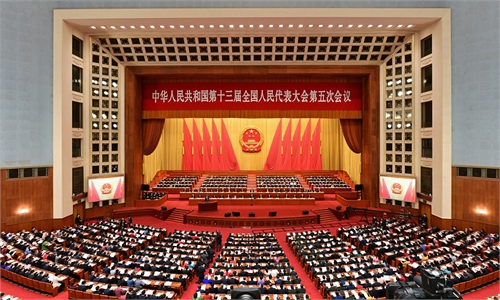
Illustration: Chen Xia/GT
Editor's Note:
The recently concluded two sessions not only laid out major policies for China's future development but also triggered a new round of discussions over the country's political system among Western media outlets, which, in the eyes of Chinese, showed huge misunderstanding. How to understand Chinese democracy? Bert Hofman, director of the East Asian Institute at the National University of Singapore, shared his views with Global Times.
GT: You mentioned that you began studying China in the early 1990s. When it comes to the changes in China throughout the years, what was the most unexpected? What was the primary cause for the change?
Hofman: For me as an economist, it's how China could eradicate extreme poverty so quickly. When I started studying China, its per capita income was barely $350 ($1,000 in today's prices), and more than half the population lived below the international poverty line. Though clearly development had taken off, I could not have imagined that less than 30 years later, extreme poverty would have disappeared from China.
GT: How do you understand China's whole-process people's democracy? Compared with Western-style democracy, what do you think is the biggest difference?
Hofman: The biggest difference lies, in my view, with the motivation for legitimacy. Whereas China sees the key to the legitimacy of its political system in delivering results for China's people, many Western political systems are based on the principle of contestability of government office.
GT: China believes that countries with different political systems can coexist, and it emphasizes win-win results in the development process. Do you share the belief? How do you view some Western countries tendency to divide the world into democracy and autocracy?
Hofman: I do believe that countries with very different political systems can live alongside each other within one international order as long as they agree on some of the basic principles of interaction between states, such as the principles of sovereign equality among states and settling disputes by peaceful means as embedded in the UN Charter.
Any international order, be it the Westphalian order of the 17th Century, the Vienna Congress of the 19th, or the UN-based order, can still have differences and tensions, even conflicts among nations. Even the UN-Charter-based order only functioned partially during the cold war. And the international order established after World War I, based on the League of Nations, largely failed.
Tensions within an existing order can have a variety of causes, such as differences in ideology, political systems, views on human rights and different economic and political interests. An international order can only be stable if it can accommodate or even resolve such conflicts.
Of course, win-win cooperation where possible should be welcomed and encouraged, and few would be against it. The fact is, countries can also differ in the perception of gains and losses, though, so high principles should, in the end, be reflected in more detailed, operational rules and institutions such as the WTO or the IMF. Individual countries have, in the end, also the obligation to live by the agreed principles in the international orders.
Notwithstanding agreement on those principles, countries' cultures, traditions and history, and people's values as embedded in individual countries' institutions differ. To be concrete, China puts a lot of emphasis on development and stability, which is understandable in light of its history. Many Western countries put a lot of emphasis on political freedoms and human rights. These differences bring along tensions in interaction, and some countries do feel strongly about such values and argue such values in interaction with other countries. As long as this is done within the framework of accepted principles, this need not and should not prevent cooperation.

